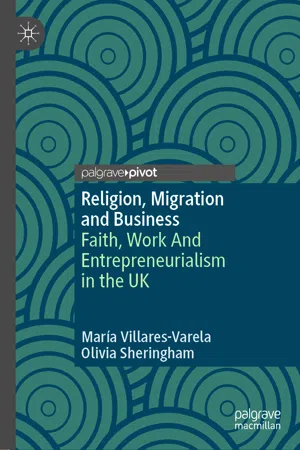1 Introduction
We are currently living in an era of increased mobility identified as the ‘age of migration’ (Castles, De Haas, & Miller, 2014) where migration has accelerated from countries in the global South to countries in the global North. In the last decades, the UK has received new waves of migrants who break with an earlier pattern of traditional postcolonial migration, now originating from myriad locations and characterised by extensive differentiation in terms of migration history, legal status as well as social, linguistic, religious, educational and occupational backgrounds, as highlighted in the debates around superdiversity (Vertovec, 2007; see also Wessendorf, 2014). New migrants are integral to our contemporary urban spaces and contribute in a variety of ways to our economies and social worlds. At the time of writing, the UK is experiencing a climate of anti-migrant hostility with particular consequences in the aftermath of the Brexit referendum and the context of the so-called ‘hostile environment’ (Redclift & Rajina, 2019) initiated by Theresa May during her tenure as Home Secretary (2010–2016). These processes have transformed the political economy of the UK, including measures to expand border control, which have included outsourcing it to other institutions such as the NHS, universities, letting agencies and banks (Lewis, Waite, & Hodkinson, 2017; see also Yuval-Davis, Wemyss, & Cassidy, 2019).
Whilst existing research overwhelmingly highlights the benefits of migration to the societies in which migrants settle (Dustmann & Frattini, 2013; Jones, Ram, & Villares-Varela, 2019; Lee & Nathan, 2010), political and media discourses generally portray migrants as a burden on welfare provision, a threat to local workers and a disruption to social cohesion. It is within this context that the ‘value’ of migrants is discussed (Kofman, 2014). The so-called ‘highly-skilled’ appear as the only tolerable category the country can shoulder within its borders, together with those who are self-sufficient and/or generate employment for the local population. Within such discourses, migrant entrepreneurs feature as potentially overcoming the burden narrative put forward in this neoliberal setting, with narratives depicting successful migrant entrepreneurs as heroic in the midst of negative portrayals of newcomers (Ram, Jones, & Villares-Varela, 2017; Williams & Nadin, 2013).
These processes of alternative labour incorporation for migrant entrepreneurs are reflected through the considerable contribution of migrants to the British business landscape. Foreign-born entrepreneurs in the UK own approximately 14 per cent of companies, with 1 in 7 new start-ups opened by migrants (Centre for Entrepreneurs/Duedil, 2014). It is also widely recognised that migrant entrepreneurs create employment opportunities (1.8 jobs created per migrant entrepreneur on average) in the countries where they settle (OECD, 2011). Moreover, existing research highlights some of the ways in which migrant businesses provide other important social contributions that go far beyond financial dividends or job creation, such as catering for low-income communities, providing training and skills for other migrants and fostering social integration (Jones et al., 2019).
Despite their crucial, though largely unrecognised, contributions to society, migrants face vital challenges in their entrepreneurial endeavours with very little support from mainstream providers (Ram et al., 2017). This has been well documented in the literature on ethnic minority and migrant entrepreneurship which highlights how persistent challenges for these entrepreneurs mainly relate to issues such as difficulties in access to finance, the nature of the markets in which they are embedded and their lack of formal and applied management skills (Carter, Mwaura, Ram, Trehan, & Jones, 2015). Scholars have highlighted how these barriers have different causes ranging from racialised discrimination in access to finance and business support (Carter et al., 2015; Ram, Smallbone, & Deakins, 2002); disconnection from mainstream support providers (Villares-Varela, Ram, Jones, & Doldor, 2017) and the fact that policy initiatives are mainly focused on individual capabilities rather than addressing structural factors that overwhelmingly disadvantage and further marginalise migrant communities (Rath & Swagerman, 2016). In ‘post-austerity’ Britain, access to support has also been affected by measures to curtail investment in important sources of information and networks for entrepreneurs, which has led to new forms of business support outside formal avenues. It is within such a context that new social actors shaping the lives, occupational and entrepreneurial aspirations of migrants have emerged, including faith-based organisations (FBOs) and churches, which are an important focus of this book. However, as we argue below, the role of religious organisations in supporting, promoting and even funding migrants’ entrepreneurial activities has been largely overlooked.
In parallel to the burgeoning literature on migrant labour and entrepreneurship, including discussions of the consequences of increased marginalisation of migrants in contexts of austerity and hostility (Humphris, 2019), there exists a growing body of work on the relationship between religion and migration across a range of disciplines. This includes work on the ways in which religious and spiritual practices shape and are shaped by mobility (e.g. Levitt, 2007); the formation of transnational rel...
